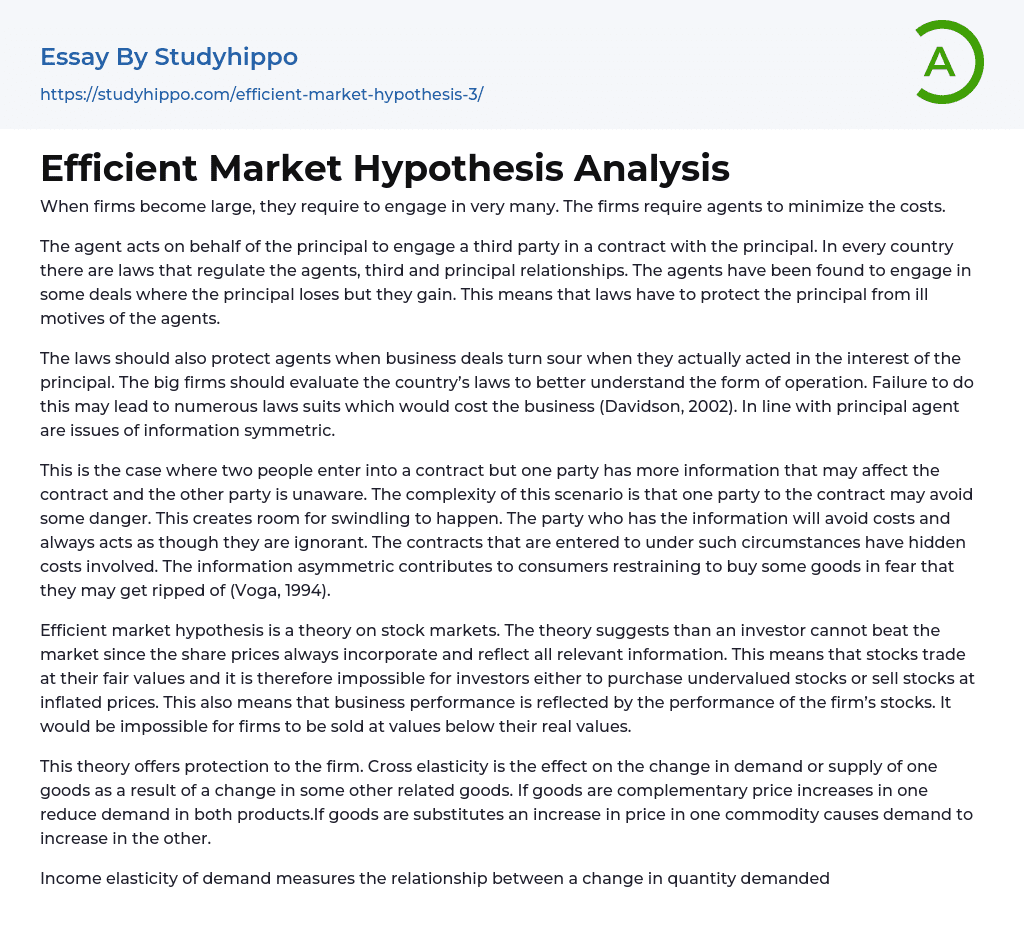As firms grow larger, they often need to engage in numerous activities, which necessitates the use of agents to reduce costs. Agents act on behalf of the principal and facilitate contracts with third parties. In all countries, laws exist to regulate the relationships between agents, principals, and third parties. However, agents have been known to engage in deals that result in losses for the principal but benefit themselves.
The laws should protect the principal from ill intentions of the agents and also protect the agents when they act in the best interest of the principal but face adverse outcomes in business deals. It is crucial for large firms to assess the country's laws to comprehend their operational requirements, as failure to do so can result in costly lawsuits (Davidson, 2002). Additionally, issues related to principal-agent include information asymmetry in contracts, where one party posses
...ses more information that could impact the contract while the other party remains unaware.
The scenario is complex as it allows one party in a contract to evade certain dangers, creating the possibility for deception. The party with the information will evade costs and feign ignorance. Contracts entered under such circumstances entail hidden costs. This asymmetry of information leads consumers to refrain from purchasing certain goods due to the fear of being deceived (Voga, 1994). The efficient market hypothesis is a theory regarding stock markets.
The theory posits that an investor cannot outperform the market because share prices always incorporate and reflect all pertinent information. Consequently, stocks trade at their fair values, making it unfeasible for investors to buy undervalued stocks or sell stocks at inflated prices. Furthermore, business performance is mirrored by the performance
of a company's stocks, preventing firms from being sold below their actual values. This theory provides protection for businesses.
Cross elasticity is the alteration in demand or supply of one good due to a change in another related good. If the goods are complementary, an increase in the price of one will reduce demand for both products. Conversely, if they are substitutes, a rise in price for one commodity will result in increased demand for the other. The income elasticity of demand evaluates how changes in income affect quantity demanded. For normal goods, they demonstrate a positive income elasticity of demand.
As income rises, the demand for normal goods also rises, whereas when income declines, the demand for normal goods decreases. To ensure efficient production, the firm manufacturing these goods must assess individuals' income levels. Point elasticity of demand quantifies the price elasticity of demand at a particular point on the demand curve, as opposed to over a range. Differentials are employed for this calculation because they capture the significance of very small changes.
By utilizing a small arc, the company examines how adjustments in price influence demand and determines the optimal point. This analysis allows the company to raise prices without adversely affecting demand and ultimately decreasing it. Marginal revenue pertains to the extra income gained from selling an additional unit of a product.
The calculation of marginal revenue allows a company to evaluate its potential by predicting the revenue generated from expanding operations and increasing output. Moreover, by determining the change in total cost when production quantity changes by one unit, the concept of marginal cost assists a firm in deciding if increasing production would decrease overall
costs. To make informed decisions about increasing output, a company should also be aware of its total fixed costs incurred during production.
Fixed costs are expenses that remain constant regardless of the level of production, while variable costs fluctuate based on output quantity. The sum of these costs represents the total production expenses. Throughout our discussion, various economic theories have elucidated the interplay between market forces and firm dynamics.
It is evident that the economy relies on firms as the fundamental unit of production. Therefore, countries seeking economic growth should prioritize the expansion of their firms. When favorable conditions are established, firms can engage in producing goods and services, resulting in increased tax revenue for governments and the construction of additional industries. It is crucial to recognize the inseparability of economies from firms and to implement appropriate business regulations through laws.
Unfair competition can have negative consequences for growing businesses and they require protection.
References
- Davidson, P (2002). Financial markets, Money and the Real World. Celtenham: Edward Elgar Publishing Ltd.
- Friedman, M (2007) Price Theory. New Jersey: Transaction Publishers.
- Garvey, M. D (2004). The Nature of the Firm. Available on 26/10/2007 from World Wide Web www.ssc.edu/
- Advertising essays
- Audience Theory essays
- Competitor Analysis essays
- Consumer essays
- Marketing Management essays
- Marketing Mix essays
- Marketing Plan essays
- Marketing Research essays
- Marketing Strategy essays
- Point Of Sale essays
- Price essays
- Procurement essays
- Product essays
- Product Differentiation essays
- Promotion essays
- Promotion And Marketing Communications essays
- Retailing essays
- Trademark essays
- Anheuser-busch essays
- Brands essays
- Detergent essays
- Product Placement essays
- Research Design essays
- New Product Development essays
- Advertisement essays
- Brand essays
- Sales Promotion essays
- Advertising campaign essays
- Consumer behaviour essays
- Offer And Acceptance essays
- Wal-Mart essays
- Discover essays
- Experiment essays
- Explorer essays
- Hypothesis essays
- Observation essays
- Qualitative Research essays
- Research Methods essays
- Theory essays
- Accounting essays
- Andrew Carnegie essays
- Automation essays
- Business Cycle essays
- Business Intelligence essays
- Business Model essays
- Business Operations essays
- Business Software essays
- Cooperation essays
- Cooperative essays
- Corporate Social Responsibility essays




